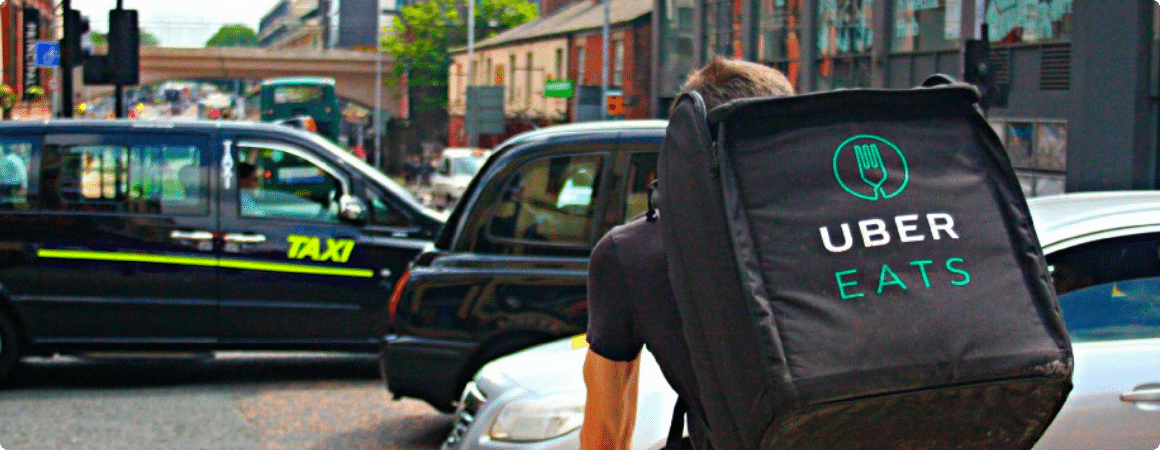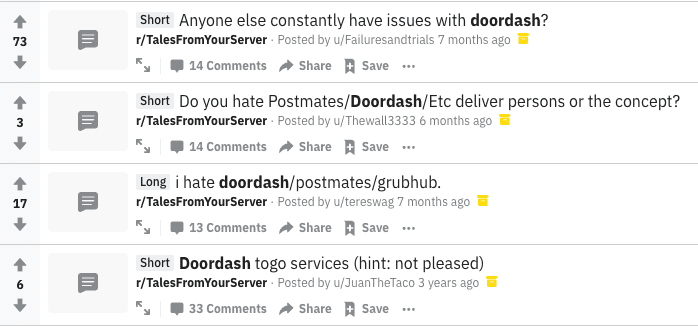Here’s what workers are saying about app-based food delivery
MARCH 28, 2019 | COWORKER.ORG

More and more consumers are getting food delivered to their homes through app-based companies. The ease with which consumers can summon a fully-cooked meal to their front door can obscure the role a range of workers play behind-the-scenes. From the restaurant workers to delivery drivers, the expansion of app-based food delivery is impacting the lives of thousands of workers. Coworker.org asked some of them what changes they’ve noticed and issues they’ve experienced on the job.
Restaurant Workers
Some restaurants owners are seeing such a large increase in online delivery orders that they’re rethinking major aspects of their business — including the physical space in which they operate. David Orkin, a real estate advisor for restaurants, told Bloomberg: “there is an overall downsizing of restaurant seating space as chains experience less foot traffic and more online and mobile-ordered pickups.”
There are even startups focused on creating new types of shelving for restaurants just to handle the growth in app-based delivery orders.
But the financial rewards of increased delivery orders, don’t always benefit restaurant workers. Two servers in Ohio told to their local news station that while business is booming due to delivery orders, fewer customers dine in their restaurants which means that “they’ve seen their tips decline up to $50 a shift.”
An article from Pittsburgh noted: “it’s becoming common to see half-empty dining rooms around town with a staff that’s trying to keep up as they fold in delivery orders… For this extra work, ‘There’s no gratuity’… When there’s tipping involved it goes to the driver.”
One restaurant employee from New Mexico told us: “It takes customers out of seats in full service restaurants and takes away tips from the host, who fulfills to go orders. Also, no individual employee is assigned the duties to fulfill the orders. On some occasions, it’s the bartender. Other times it’s the host. Either way the employees are losing tipped income and taking on additional duties.”
Subreddits for restaurant workers are filled with a litany of complaints about how third party delivery companies impact their work. One server recently wrote:
“I get $2.13 an hour plus tips. Spending half my night doing these orders is killing my wallet… It’s pulling me away from my tables… We do a lot and I want to be paid for it.”
Another complained of the logistical challenges facing restaurant staff: “We receive the automated call from DoorDash notifying us of a pickup order. We don’t receive the email so we obviously have no way of making their food. This happens constantly. I have to call DoorDash personally, be put on hold, explain the issue and they have to resend the email.”
Delivery Drivers
In the last few years, the number of app-based food delivery companies have grown rapidly including Bite Squad, Caviar, DoorDash, Eat24, GrubHub, Instacart, Postmates, Seamless, Shipt, Uber Eats, and many more.
We asked 50 self-identified workers for different app-based food delivery companies about their experiences on the job. The top issues they identified were: low pay (84%); damage or wear and tear to their vehicles (70%); and traffic delays and difficulty parking (60%). One driver summed up comments many others shared about the problems with parking:
“Parking is almost always a challenge and I frequently take risks by parking in unsafe or illegal places.”
Half of the workers expressed that they had been held responsible for mistakes or delays at the restaurant where they picked up food. As one driver said:
“It’s frustrating when you have to order the food, then you have to wait. So now it affects your ratings and it’s beyond your control.”
Thirty-two percent expressed frustration with the ratings systems of the apps for which they’ve worked and 14% reported experiencing discrimination or harassment on the job.
Several workers who do grocery shopping for delivery also mentioned that some apps allow customers to order items that are out of stock in stores — and then workers can be “penalized for substitutions when [customers] don’t like them.”
Recently, workers at Instacart — with assistance from the organization Working Washington — spoke out about several issues they’ve experienced. One of the problems the workers identified was that the company was using customers’ tips to subsidize the guaranteed pay rates it promised to drivers. After drivers across the country spoke out, the company changed its policy. But other companies, including DoorDash, reportedly have the same policy. A driver for Bite Squad created this campaign on Coworker.org to change that company’s tipping policy.
Starbucks’ Partnership With Uber Eats
To get a better sense of how the introduction of app-based delivery impacts food workers in stores, we asked 20 self-identified Starbucks baristas in locations that have been participating in coffee chain’s partnership with Uber Eats how it’s been going. As of mid-March 2019, customers can order Starbucks for delivery by an Uber Eats driver in Boston, Chicago, New York City, Los Angeles, Miami, San Francisco and Washington, DC.
Seventy percent of the baristas said that counter space and other physical areas of their locations were now more crowded. As one partner said: “We are a very tiny store, and the Uber Eats section takes up a lot of space we don’t really have.”
Fifty-five percent said their ability to offer the best customer service has lowered. For example: one partner said they’ve experienced problems with “drivers showing up when orders aren’t ready,” while another has noticed “items sitting for lengthy period of time before pick up.” The increase in online orders has also reportedly impacted in-store customers in some locations.
One partner said: “customers in the cafe are dissatisfied with wait times — and rightly so”; while another said: “to deliver quality for the Uber customer, I’m forced to sacrifice time to better serve in-store customers.”
Forty percent said they were feeling more overworked. One partner said: “I have been a partner for 12 years, in high volume cafe, low volume cafe and high volume drive thru. Each additional method of getting customers their drinks has negatively impacted partners and customer connection with no real attempt to address this added workload from corporate.” And another said simply: “We have more work to do and less labor to do it.”
(On the subject of feeling overworked: Starbucks partners across the U.S. have continued to join this campaign started on Coworker.org in 2016 that says low staffing levels in some stores created “an atmosphere where baristas are worn to the bone without being able to take a breath.” In comments on the petition page, many baristas have shared their own experiences and perspectives on how a range of factors have led them to feel overworked.)
Thirty-five percent said their tips were lower and a few said they are making less money overall. While others said that they’ve been blamed for quality or timing issues by customers on the receiving end of the delivery.
As food delivery technology evolves and restaurants respond to the changes, it’s important to listen to the voices of the broad range of workers impacted by these new business models.
Coworker.org is a global platform to advance change in the workplace. Our platform makes it easy for individuals or groups of employees to launch, join, and win campaigns to improve their jobs and workplaces. You can start your own campaign for changes you want to see in your workplace here at Coworker.org, or contact us at [email protected] if you would like to discuss a workplace issue with our team.
LABOR WORKERS RIGHTS STRIKE





